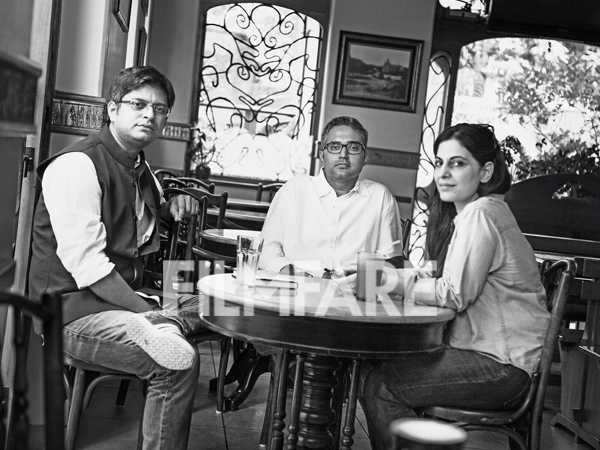
Sudip Sharma writes a story of revenge, NH 10, from the woman’s point of view, encounters mayhem with the Censor Board… only to finally walk away with bouquets and box-office glory.
Juhi Chaturvedi dwells on an unconventional father-daughter relationship in Piku… the film was talked about as the most delightful film of the year.
Himanshu Sharma writes a sequel to 2011’s romcom and makes it quirkier than the previous one. Tanu Weds Manu Returns (TWMR) – busting small-town myths about man-woman stereotypes – is declared a runaway success.
The films that have truly made a big noise at the box-office this year have been small-budget chronicles like NH 10, Piku and TWMR. Crisp screenplay, identifiable characters and relatable themes seem to have hit a chord with the audiences. But have the writers who penned these success stories got their fair share of applause? As actor Ranveer Singh recently observed, “Writing is one of the most undervalued aspects of filmmaking in our industry.” And we couldn’t agree more. In fact, remakes of South films or ‘inspirations’ from Hollywood flicks are more feted than the bunch of new age talent who spin tales of the here and now, the real and raw.
The awesome threesome – Juhi, Sudip and Himanshu came together for a shoot at Café Universal in Fort. As they bond over bun-maska/chai, they also discuss their passion for the movies. While Juhi and Himanshu were elated to discover their common Lucknow roots, Sudip gushed about Vishal Bhardwaj’s and Anurag Kashyap’s genius. And when Himanshu insisted that cuss words are considered like blessings in Benaras and that the Censors should have no problem with them, the free-spirited Juhi and Sudeep couldn’t agree more… Moreover, the trio unanimously insisted that the best stories are those simply told…
Read on…
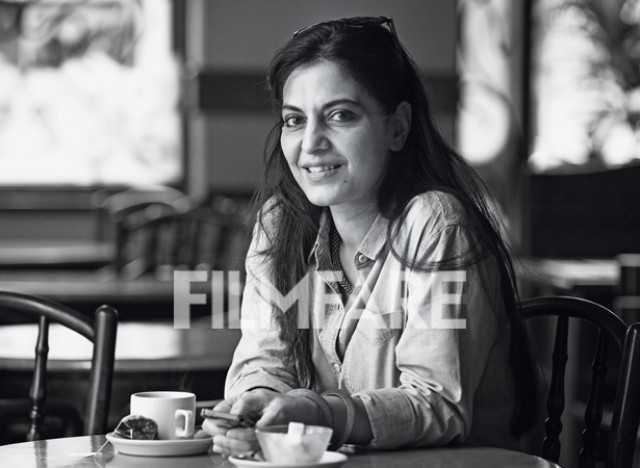
E-MOTIONALLY CHARGED - JUHI CHATURVEDI
She pulled out pushed-under-the-carpet topics and celebrated them on the big screen – albeit with humour and sensitivity. Most would be surprised to know that Juhi’s first love is painting – not writing! But her professor in college was not in favour of pursuing it as there was ‘no money’ in it. So Juhi opted to write commercials. She has written advertisements for Titan – the Aamir Khan series, Red Label tea, Cadbury etc. During her stint there, she met director Shoojit Sircar and worked with him for commercials.
Then Juhi wrote the dialogue for Shoojit’s film Shoebite, which never released. But her subsequent story on sperm donation with Ayushmann Khurrana, Vicky Donor, bagged her the Filmfare Award for Best Story. “After that applause, I didn’t want to be a one-film wonder. So, Piku was extremely critical for me,” she says.
Juhi chose to work with Shoojit because of his unique perspective. “After Vicky Donor, I met some filmmakers who would say – aadhey ghantey ka plot hai, phir ek gaana, phir aadhey ghantey ka fight sequence… you don’t have to write a more than an hour long story. This kind of forced mindset scared the shit out of me,” she shares.
But Amitabh Bachchan-Deepika Padukone-Irrfan starrer Piku has changed the dynamics for writers. “I’m glad that writing is getting importance not only from critics but even the audiences. However people make you feel guilty for getting credit as a writer. They say, ‘We have not seen a writer being praised so much, not bad yaar’. They aren’t used to the writer having the upper hand.”
She’s all praise for Mr Bachchan. “He’s someone who respects the writers. Whatever you write is the golden word for him. He rehearsed the lines with me and I can’t believe that.” Juhi is known for for etching real-life characters – whether it’s the mother who unwinds with a peg of whiskey after a hard day’s work in Vicky Donor or the father in Piku who is over possessive about his daughter to the point of being selfish. “Characters drive the films. If they are correctly written, 40 per cent of your job is done.”
Her writing was compared to that of veterans Hrishikesh Mukherji and Basu Chatterjee, which she considers a huge compliment. She confides their films influenced her. “They made clean films with middle class values. I connect with them because I belong to the same strata of society.” For someone who has been a salaried writer for 17 years, the scene is now unpredictable. “The job of a film writer is tough. I don’t even know what my market value is. The truth is that if you ask for more, they move on to someone else. But I’m not here to do social service na? If I’m giving my everything to the film, then I’d expect something that satisfies my pocket as well. Even after Piku, I can’t demand what I want to. I’m not in a hurry either.” She has begun writing for Shoojit’s next and has also signed a film with another director. We are waiting to hear her stories…

SHORT TAKES
Advice to budding writers
The desperation to make ends meet often leads struggling writers to sell their scripts. That’s sad. The hurry to make money or see your name up there is deceptive. Patience is the key. Don’t sell yourself, your soul. If it’s not working out, do something else and then return to writing.
Well-written films
Paan Singh Tomar by Tigmanshu Dhulia and Sanjay Chauhan. Luck By Chance by Zoya Akhtar, Do Dooni Chaar by Habib Faisal, Chak De India! and Rocket Singh Salesman Of The Year by Jaideep Sahni are well written. Also every writer should watch Ek Ruka Hua Faisla. It’s well adapted from the Hollywood film 12 Angry Men.
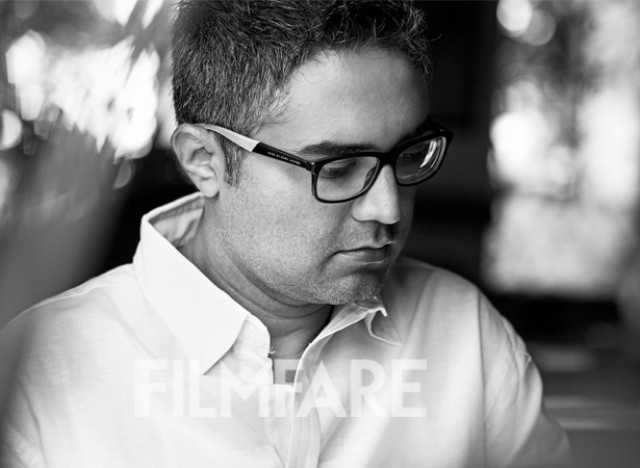
The Dark and deep - Sudip Sharma
Sinister is Sudip Sharma’s genre. NH 10 just gave a glimpse of it. And Udta Punjab will expose harsher realities on 70mm. Sudip completed his MBA from IIM Ahmedabad. But the corporate sector left him bored. All he wanted was to be at the movies. “I’ve grown up loving movies.” But it was while making a short film that he realised that writing attracted him the most.
“The struggle was at two levels. First one was getting to know my craft, my strength. Unfortunately, I was not one of the gifted ones. I had to learn it the hard way. I wrote 15-20 drafts until it resembled a script. The other part was the external struggle. I didn’t know anyone in the industry. Getting in touch with people, hoping that they like your work is another ballgame.”
Navdeep Singh (director of NH 10) and Sudip had made a film titled Rock The Shaadi, which got shelved midway. Navdeep had this idea of a couple on the run in the Haryana badlands. “But once NH 10 was almost written, we couldn’t raise the funds. It was frustrating. Everyone loved the script but no one wanted to put their money on it. Firstly, because it was too edgy and violent. Secondly, we didn’t have a male protagonist.” But eventually things did fall in place for him with Phantom Films and Clean Slate Films stepping in.
Sudip had no actor in his mind while writing the character of protagonist Meera. “Once you have an actor in mind, his/her image will influence you. But letting an actor own it and go beyond it will add more to your writing.” That’s exactly what Anushka Sharma did. No one thought she would break out of her bubbly image and give such a gut wrenching performance.
But the biggest hurdle was when the Censor Board didn’t deem the film fit for public viewing. “Navdeep and I looked at each other with disbelief. We were not trying to sensationalise violence or murder. It was completely ridiculous.” The Censor Board finally passed it with a few cuts. “Words like kutti and saala were cut. We tried to explain that the situation the characters were in, they would speak so, not in Victorian English!” He adds, “If you fall into self-censorship then as a society it’s a downhill from there,” he cautions.
Sudip finds it funny that reel is blamed for crimes in the real world, “It makes me feel like God - that you’re actually orchestrating things. I wish screenwriters had that much of power. But in reality, they can barely make ends meet. It’s just finding an easy scapegoat instead of solving the real issues.”
His next release is Abhishek Chaubey’s Udta Punjab, which deals with drug abuse in Punjab. Sudeep says that it’s the most difficult script he has written till date. Also Navdeep and he are trying to revive their old script titled Caneda. It’s set in the ’90s when the Punjabis took over the mafia scene in Canada. “Sometimes people take up writing as a temporary job. Everyone out there wants to become a director. But for me it’s only writing. I understand the importance of being a specialist,” he smiles.

SHORT TAKES
A good scene occurs in your mind at any odd hour. You can’t express your joy by screaming or playing loud music as your wife is sleeping in the next room.
Our films lack rigour and consistency. Comedy is followed by an action scene and then there is dance!
The clashes with Navdeep were never violent. We had an alternate ending in our minds. We had a discussion on whether the character of Arjun (played by Neil Bhoopalam) in NH 10 would survive or not. Finally I won!
Women are not safe in India, particularly in North India. The gender politics there needs a correction.
Films which I enjoyed recently Chaitanya Tamhane’s Court, Nagraj Manjule’s Marathi film Fandry, Neeraj Ghaywan’s Masaan and Anurag Kashyap’s Ugly.
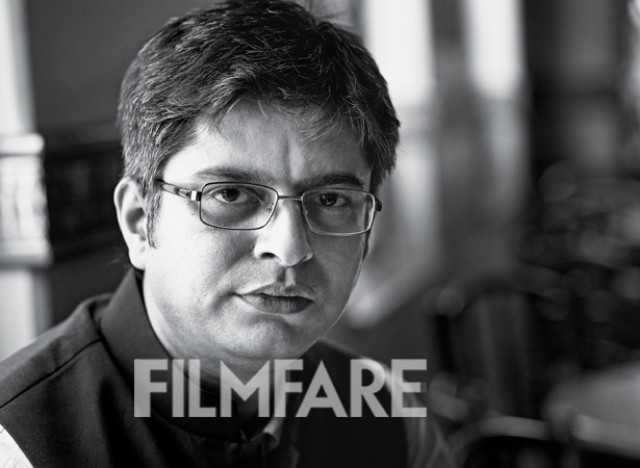
Blockbuster Returns - Himanshu Sharma
After leaving us teary-eyed in Raanjhanaa, Himanshu Sharma has made us laugh off our seats with Tanu Weds Manu Returns (TWMR). Born in Lucknow, Himanshu Sharma was all set to become an IAS officer. He moved to Delhi to complete his graduation and joined an amateur theatre group called Players in college. There he directed, wrote scripts and even acted. Soon Himanshu realised that joining the government service was not his calling. Instead he wrote a health show for NDTV before moving to Mumbai. Here, he became the last AD in Ekta Kapoor’s TV show Kkussum. “I quit it within 15 days and eventually met Aanand L Rai,” he recalls the defining tryst with the director.
Tanu Weds Manu (TWM), Raanjhanaa and now TWMR… the hat-trick of hits with Aanand has endorsed their creative chemistry. “With Aanand, I get to write what I want to. After TWM, I wanted to attempt something emotionally overwhelming. He allowed me to do so. That’s how Raanjhanaa happened. The climax of TWM and Raanjhanaa were written while we were shooting. There are creative differences but there is unsaid mutual trust between us.”
The Sonam Kapoor-Dhanush starrer was appreciated but somehow people and critics believed that Raanjhanaa promoted stalking, “I will never unnecessarily defend my work. But what else could Kundan’s character (played by Dhanush) have done? He can’t be ‘politically correct’ like Barkha Dutt naa? He was a ganwar from Benares. He cannot talk poetry. He’s just a product of his time and geography. A work of art is free for interpretation.”
He adds, “Stories are like carnivores, they devour your blood, flesh and soul. After Raanjhanaa, I didn’t want to cry anymore. I wanted to write a funny film. And thus I attempted TWMR. I agree, it’s a farcical film. The very idea of falling for a woman who looks like your wife is ludicrous. Where does it happen in real? But the milieu was real and it was exciting to juxtapose two different women coming from different backgrounds against each other. It’s only in India where you have women sporting Dolce & Gabbana bags and women observing solah somvar ka vrat.”
Spending most of his growing up years in UP, he gets the North Indian aesthetics perfectly. “You can only do what you’re best at. I love that world. Overall, it’s about my perspective. I come from middle - class strata and those values reflect in my work.” Though the film became a blockbuster, Himanshu is humble about the fact. “We’ve become used to mediocre stories. We’ve been feeding people khichdi in the name of biryani for so long. So, even a little pulao does the magic. I don’t believe I’ve done anything great. TWMR is honest and entertaining.”
Himanshu will don the director’s hat soon, “I have a script, which I’m pretty kicked about it. I pitched it to Aanand and he asked me to make it. I told him, ‘Ya, I will make it better than you!”
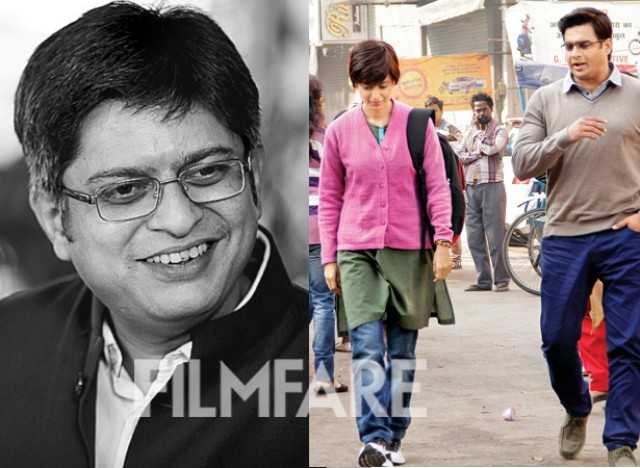
Short takes
As a writer you need to be responsible to the people who’re paying ` 250 to watch your film. You cannot ditch them. That’s being corrupt. Tomorrow my film might not work, but that I wrote it with honesty will bring me peace.
Do read your film reviews, especially the bad ones. A couple of negative reviews of Raanjhanaa and TWMR made sense. It makes you learn and keep growing.
My message to the Censor Board is that you cannot kill voices. Be a little intelligent. If you don’t make a character from Benaras include abuses in his language, how can you do justice as a writer? If the context is right then you have to pass it.

SHOW COMMENTS